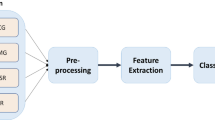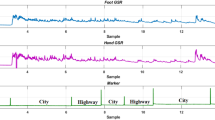Abstract
We apply machine learning techniques to detect moments of stress and cognitive load during simulator driving experiences. The use of the electrical skin conductance, or more precisely the electrodermal activity (EDA), is particularly interesting for assessing drivers’ states because it is easily measurable; it is also involuntary and uncontrollable. Detection of responses to external stimuli can be performed on a scale of seconds with an accuracy of 86%. Moreover, we observe that responses to stress events and cognitive efforts can be differentiated with an accuracy of 80% over sub-minute time intervals. We compare our results to others reported in the literature. Automatic and fast detection of responses to stressful events and high cognitive workload can be used to assess drivers’ user experience (UX) and their interaction with their vehicle.
Access this chapter
Tax calculation will be finalised at checkout
Purchases are for personal use only
Similar content being viewed by others
References
Zontone, P., Affanni, A., Bernardini, R., Del Linz, L., Piras, A., Rinaldo, R.: Supervised learning techniques for stress detection in car drivers. Adv. Sci. Technol. Eng. Syst. J. 5(6), 22–29 (2020)
Healey, J.A., Picard, R.W.: Detecting stress during real-world driving tasks using physiological sensors. IEEE Trans. Intell. Transp. Syst. 6(2), 156–166 (2005)
Meteier, Q., et al.: Classification of drivers’ workload using physiological signals in conditional automation. Front. Psychol. 12, 596038 (2021)
Chen, L.-L., Zhao, Y., Ye, P.-F., Zhang, J., Zou, J.-Z.: Detecting driving stress in physiological signals based on multimodal feature analysis and kernel classifiers. Expert Syst. Appl. 85, 279–291 (2017)
Dosovitskiy, A., Ros, G., Codevilla, F., Lopez, A., Koltun, V.: CARLA: an open urban driving simulator. In: 2017 Conference on Robot Learning (CoRL), pp. 1–16 (2017)
NeuroKit2 Homepage. https://neurokit2.readthedocs.io/
Knight, S., Heinrich, A.: Different measures of auditory and visual stroop interference and their relationship to speech intelligibility in noise. Front. Psychol. 8(230) 2017
Pungu Mwange, M.-A., Rogister, F., Rukonić, L.: Measuring driving simulator adaptation using EDA. In: Proceedings of the 13th International Conference on Applied Human Factors and Ergonomics (AHFE) (2022)
Acknowledgement
We acknowledge the support by the project VIADUCT under the reference 7982 funded by Service Public de Wallonie (SPW), Belgium.
Author information
Authors and Affiliations
Corresponding author
Editor information
Editors and Affiliations
Rights and permissions
Copyright information
© 2022 The Author(s), under exclusive license to Springer Nature Switzerland AG
About this paper
Cite this paper
Rogister, F., Pungu Mwange, MA., Rukonić, L., Delbeke, O., Virlouvet, R. (2022). Fast Detection and Classification of Drivers’ Responses to Stressful Events and Cognitive Workload. In: Stephanidis, C., Antona, M., Ntoa, S. (eds) HCI International 2022 Posters. HCII 2022. Communications in Computer and Information Science, vol 1581. Springer, Cham. https://doi.org/10.1007/978-3-031-06388-6_28
Download citation
DOI: https://doi.org/10.1007/978-3-031-06388-6_28
Published:
Publisher Name: Springer, Cham
Print ISBN: 978-3-031-06387-9
Online ISBN: 978-3-031-06388-6
eBook Packages: Computer ScienceComputer Science (R0)




